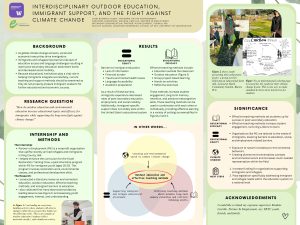Interdisciplinary Environmental Education, Immigrant Support, and the Fight Against Climate Change
The current educational system in the United States does not properly support immigrant and refugee students as a result of systemic educational barriers. Consequently, disparities in educational attainment, social mobility, and employment disproportionately impact immigrant populations compared to those who are native-born. The purpose of this study is to illustrate how utilizing interdisciplinary environmental teaching methods can properly support immigrant needs while also promoting environmentalism to combat anthropogenic climate change. For my internship I created informed lesson plans and activities for a program focused on restoration work, environmental education, and job training skills serving immigrant youth in King County. I collected results through a comprehensive literature review, qualitative observations, and quantitative data collection. I found that using education outside the classroom, group project-based learning, reflective exercises, and hands-on learning were most effective at increasing youth engagement and metacognitive skills. Additionally, spending time and learning outdoors increases environmental caring, spurring pro-environmental behaviors. Therefore, by utilizing more effective teaching methods, educators can promote educational equity for immigrant and refugee students while simultaneously creating individuals who support climate action.
